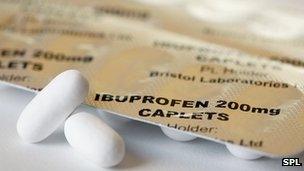Ibuprofen at 50: The love affair with painkillers
- Published
- comments

It is 50 years since ibuprofen was discovered. It has joined aspirin and paracetamol in the special trinity of medicines that people keep close at hand, even when they're well. But have we come to rely on it too much?
You might find it in a red packet in the UK, or a blue packet in the US.
Inside, the silver blister packs promise relief from hangover-induced headaches, the ubiquitous bad back and any number of other ailments.
Ibuprofen has gained a special status since its development in a small test lab in a house in Nottingham in 1961.
Since then it has become a bedrock of pain relief and fever treatment all over the world. As an anti-inflammatory it has been taken by sufferers of osteoarthritis and rheumatoid arthritis, as well as generations of injured sportspeople, professional and amateur.
But unlike most drugs that we get on the recommendation of a doctor, ibuprofen is in that trinity - along with paracetamol and aspirin - that we primarily self-medicate with.
These drugs leave us as our own doctors. They have escaped the confines of the pharmacist's shelf and taken up residence in the supermarket, corner shop and all-night garage.
For many people ibuprofen is an essential tool in their bathroom cabinet - as well as featuring in many a handbag and desk drawer around the world.
Stand in an open-plan office and ask loudly for ibuprofen and somebody will have some. For "just in case", more than likely.
But is this a good thing?
Doctor and medical columnist Thomas Stuttaford says he thinks ibuprofen is a reasonable analgesic and anti-inflammatory - but it has more side effects than people realise.
"Side effects include renal damage. It's not terribly well tolerated by the over 65s. It can cause gastric bleeding. And NSAIDs [the group of anti-inflammatory drugs that ibuprofen belongs to] contribute to something in the region of 2,000 deaths a year in the UK."
The risk factors associated with NSAIDs are much discussed, external but all medicines can potentially cause side effects, and any figures for deaths have to be measured against the vast numbers of people who use ibuprofen without ill-effect. The same calculation has to be made for aspirin.
But some, like Stuttaford, also take issue with the use of ibuprofen as a sort of medical crutch.
He believes that governments have encouraged the use of anti-inflammatories and analgesic drugs like ibuprofen because it cuts down on visits to casualty departments and doctors' surgeries.
"Advice from doctors used to be 'take two aspirin and call me in the morning'. Now the modern day equivalent is 'take two ibuprofen and call me in the morning'."
Dr Stuttaford says he does not think this is terribly useful.
"Pain is nature's way of telling you something is amiss. I don't approve of over-the-counter patient-directed painkillers - it's much better to get a proper assessment of the pain from a doctor."
Pain management consultant Dr Chris Wells says ibuprofen is a useful drug that helps about a third of people who take it, and reduces their pain by about 50%.
"It is important for a minority of patients with rheumatoid arthritis and osteoarthritis," he says. "It's also a good drug for minor acute injuries, sprained ankles, minor burns, and saves people going to the GP [general practitioner]."
But he also has concerns about ibuprofen and its side effects.
"It's my belief that it would not get an over-the-counter licence today - but neither would aspirin."
He also thinks the overuse of ibuprofen shows that we have lost the confidence to deal with minor aches and pains in our lives without pain relief.
"It's become a pill for all symptoms," he says. "For many people, exercising and weight loss are essential in managing pain, but they are sadly out of fashion."
Dr Stuttaford says our reliance on drugs like ibuprofen goes hand in hand in the UK with the decline in GP services.
"Although we have a much bigger armoury in dealing with health problems, people no longer have a personal relationship with their GPs. They don't know their history, they don't know their mothers and fathers.
"The average allocated time with the doctor is a mere seven minutes. If you're dealing with an octogenarian they might not be able to get their clothes off for a proper examination in seven minutes.

The tablets have brought relief to millions, but have they helped change our relationship with doctors?
"There's no time to talk. Prescribing them with ibuprofen is one way of shutting them up."
The result? "Many people just bypass the doctors and go straight to the chemists instead."
Ailsa Bosworth, chief executive of the National Rheumatoid Arthritis Society, says people will often go to their GPs in pain, and will be prescribed something like ibuprofen that brings some relief.
But what they really need, she says, is to see a consultant rheumatologist, and the use of anti-inflammatories can delay a doctor in making a diagnosis.
"That doesn't mean that they don't play a useful role for some people, and they are important at times, but I sometimes think that doctors don't spell out the risk-benefit scenario.
"You can be taking NSAIDs like ibuprofen for a long time and suddenly get a massive bleed. They are not totally benign."
She says anti-inflammatories such as ibuprofen play a role in managing conditions like rheumatoid arthritis, but that role has changed since new drugs treatments have become available.
Ibuprofen has a following among endurance runners and people playing fast-paced sport such as squash, who use it before or after a big race or match. But many believe the practice is, at best, unwise, external.
Peter Banister, personal trainer at BSAG fitness in London, says he does not recommend its use.
"People who take painkillers before training or before competing in a big race are inhibiting their body's ability to respond to their environment," he says.

Ibuprofen has a following among marathon runners
"When you are undertaking strenuous exercise you need to be able to react to pain, not mask it."
Banister is not keen on using ibuprofen to try to help relieve muscle soreness after exercise either.
"Research shows that use of anti-inflammatories doesn't actually inhibit muscle soreness and can in fact inhibit muscle growth."
Research into ibuprofen is ongoing, with possible new uses being discovered. In some studies, low doses of ibuprofen over a long period of time were found to be better than a placebo in preventing Alzheimer's disease, external.
Earlier this year, researchers at Harvard medical school announced that people regularly consuming ibuprofen were reported to have a 38% lower risk of developing Parkinson's disease.
Prof Kim Rainsford, a world authority on ibuprofen, says the beauty of the drug is its chemical simplicity.
"It is handled and metabolised in the body very predictably. It accumulates very well in sites where you need pain relief.
"It's got a very good safety profile, it's got wide acceptance because it does control inflammation as well as the painful symptoms."
Whilst casual overuse of ibuprofen might not be wise, there is no doubting it has provided accessible, effective and well-tolerated pain relief for millions of people around the world.
And it's for that reason it's likely to stay in people's desk drawers and handbags for many years to come.